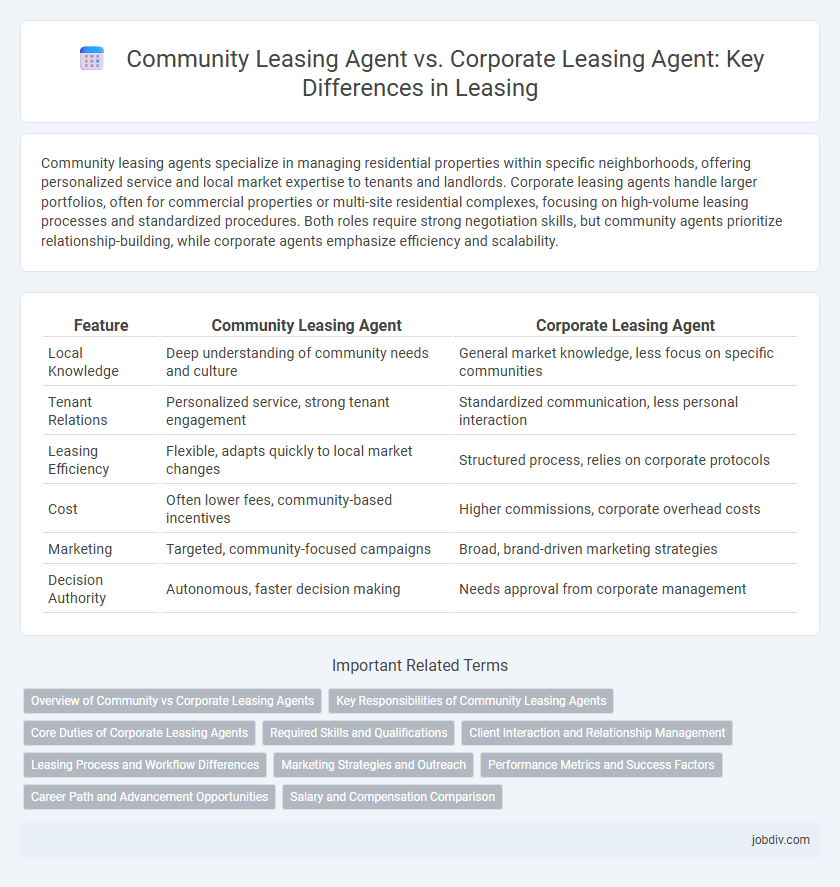Community leasing agents specialize in managing residential properties within specific neighborhoods, offering personalized service and local market expertise to tenants and landlords. Corporate leasing agents handle larger portfolios, often for commercial properties or multi-site residential complexes, focusing on high-volume leasing processes and standardized procedures. Both roles require strong negotiation skills, but community agents prioritize relationship-building, while corporate agents emphasize efficiency and scalability.
Table of Comparison
| Feature | Community Leasing Agent | Corporate Leasing Agent |
|---|---|---|
| Local Knowledge | Deep understanding of community needs and culture | General market knowledge, less focus on specific communities |
| Tenant Relations | Personalized service, strong tenant engagement | Standardized communication, less personal interaction |
| Leasing Efficiency | Flexible, adapts quickly to local market changes | Structured process, relies on corporate protocols |
| Cost | Often lower fees, community-based incentives | Higher commissions, corporate overhead costs |
| Marketing | Targeted, community-focused campaigns | Broad, brand-driven marketing strategies |
| Decision Authority | Autonomous, faster decision making | Needs approval from corporate management |
Overview of Community vs Corporate Leasing Agents
Community Leasing Agents specialize in managing residential properties within specific local markets, offering personalized tenant relations and in-depth knowledge of neighborhood dynamics. Corporate Leasing Agents operate across multiple regions or portfolios, focusing on standardized processes, high-volume leasing, and alignment with company-wide goals. Understanding the distinction between these roles helps property owners choose agents based on scale, client interaction style, and operational efficiency needs.
Key Responsibilities of Community Leasing Agents
Community Leasing Agents primarily manage tenant relations by promptly addressing resident inquiries, coordinating property tours, and facilitating lease agreements within specific residential communities. They are responsible for maintaining occupancy rates through targeted local marketing strategies and fostering a positive living environment to enhance resident retention. Their role involves direct interaction with the community, ensuring compliance with leasing policies and collaborating closely with maintenance teams to resolve issues efficiently.
Core Duties of Corporate Leasing Agents
Corporate leasing agents primarily manage large-scale commercial property portfolios, negotiating lease terms, coordinating tenant improvements, and ensuring compliance with corporate leasing policies. They collaborate with legal teams and finance departments to draft and execute complex lease agreements tailored to business needs. Their core duties also include market analysis to optimize property occupancy and maximize return on investment for corporate real estate assets.
Required Skills and Qualifications
Community Leasing Agents require strong interpersonal skills, local market knowledge, and proficiency in community engagement to effectively manage tenant relations and promote property offerings. Corporate Leasing Agents must possess advanced negotiation abilities, proficiency in data analysis, and experience with lease administration software to handle complex portfolio management. Both roles typically demand a high school diploma or equivalent, though corporate positions often prefer a bachelor's degree in business or real estate.
Client Interaction and Relationship Management
Community Leasing Agents excel in personalized client interaction by building strong, localized relationships and understanding individual tenant needs, fostering long-term loyalty within specific residential neighborhoods. Corporate Leasing Agents manage larger portfolios with a focus on efficiency and scalability, using data-driven tools to handle high volumes of client inquiries and maintain consistent communication across diverse properties. Both roles require strong relationship management skills, but Community Agents prioritize depth of connection whereas Corporate Agents emphasize breadth and systematic client engagement.
Leasing Process and Workflow Differences
Community Leasing Agents focus on localized tenant engagement, conducting personalized property tours and handling lease documentation directly to streamline community-specific needs. Corporate Leasing Agents manage broader portfolios with standardized leasing processes, utilizing centralized software systems for tenant screening, contract management, and compliance tracking across multiple properties. The workflow difference lies in Community Agents' hands-on approach tailored to local markets, while Corporate Agents emphasize efficiency and consistency through scalable, technology-driven operations.
Marketing Strategies and Outreach
Community leasing agents leverage localized marketing strategies, including neighborhood events, social media groups, and partnerships with local businesses to build strong, trust-based relationships within specific communities. Corporate leasing agents utilize broad-scale outreach, employing data-driven digital advertising, centralized call centers, and regional campaigns to target diverse demographics across multiple locations efficiently. Both roles optimize their approaches to maximize tenant engagement and occupancy rates, but community agents prioritize personalized touchpoints while corporate agents focus on volume and consistency.
Performance Metrics and Success Factors
Community Leasing Agents excel in local market knowledge, tenant relations, and personalized service, often achieving higher resident retention rates and faster lease turnovers. Corporate Leasing Agents focus on standardized processes, data-driven marketing strategies, and scalability, resulting in consistent performance metrics such as occupancy rates and lease renewal percentages across multiple properties. Key success factors for Community Leasing Agents include strong community engagement and responsiveness, while Corporate Leasing Agents rely on technology integration and operational efficiency to drive leasing volume and revenue growth.
Career Path and Advancement Opportunities
Community Leasing Agents typically start with entry-level roles in residential or mixed-use properties, gaining hands-on experience managing tenant relations and property operations, which can lead to advancement into senior agent or property management roles within local firms. Corporate Leasing Agents often work within larger real estate companies or portfolios, accessing structured career paths that include specialized training programs, opportunities for cross-departmental movement, and faster progression to regional management or executive leasing positions. The corporate environment generally offers broader professional development resources and a clearer trajectory toward leadership roles compared to the more localized, relationship-driven advancement found in community leasing careers.
Salary and Compensation Comparison
Community Leasing Agents typically earn a median salary ranging from $40,000 to $55,000 annually, with compensation often including bonuses tied to resident retention and lease renewals. Corporate Leasing Agents tend to have higher base salaries, generally between $50,000 and $70,000 per year, supplemented by performance incentives, profit-sharing, and comprehensive benefits packages due to their affiliation with larger property management firms. Variations in salary are influenced by factors such as market size, property portfolio complexity, and individual negotiation skills within the leasing sector.
Community Leasing Agent vs Corporate Leasing Agent Infographic

 jobdiv.com
jobdiv.com